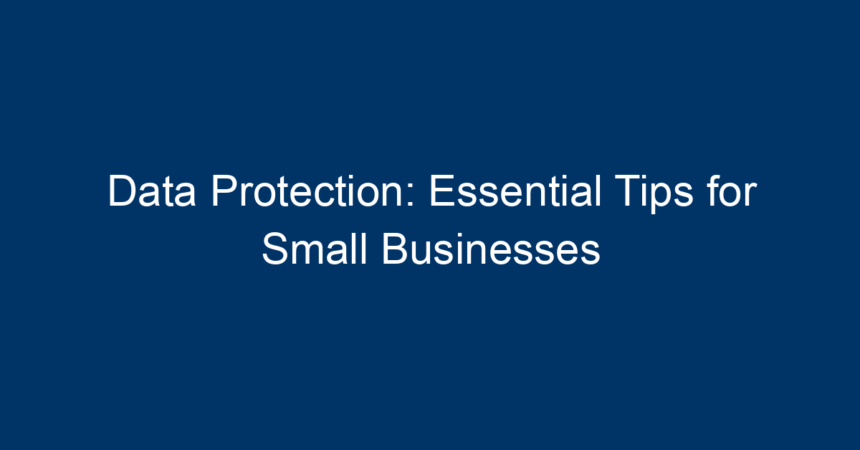In today’s digital landscape, where data breaches and cyber threats are becoming increasingly common, data protection has never been more crucial, especially for small businesses. Small enterprises often operate with limited resources, making them prime targets for cybercriminals. In this comprehensive guide, we’ll explore essential tips for effective data protection that small businesses can implement to safeguard their assets while fostering consumer trust.
Understanding the Importance of Data Protection
Data protection refers to the processes and mechanisms employed to safeguard sensitive information from unauthorized access, theft, and loss. For small businesses, protecting customer data not only ensures regulatory compliance but also enhances brand reputation. A single data breach can result in significant financial setbacks, loss of customer trust, and potential legal repercussions. Therefore, investing in robust data protection measures is not just wise; it’s essential.
The Rules and Regulations
Before diving into strategies, it’s vital to understand the legal landscape surrounding data protection. Regulations like the General Data Protection Regulation (GDPR) and the California Consumer Privacy Act (CCPA) impose strict guidelines on how businesses must handle personal data. Non-compliance can lead to hefty fines and legal challenges. Staying informed about the laws that apply to your business is a foundational step in implementing effective data protection practices.
Essential Data Protection Tips for Small Businesses
1. Conduct a Comprehensive Data Assessment
The first step in building a robust data protection strategy is performing a detailed assessment of the data your business collects, uses, and stores. This includes:
- Types of Data: Identify what kinds of data you handle. This could range from customer contact information to payment details and employee records.
- Data Sources: Understand where your data is coming from and how it’s being collected.
- Data Storage: Evaluate where this data is stored—on-premises servers, cloud services, or third-party vendors.
A thorough data assessment enables you to pinpoint vulnerabilities and prioritize areas needing immediate attention.
2. Implement Strong Security Policies
Your security policies are the backbone of your data protection strategy. They should encompass guidelines for employees on how to manage sensitive information. Key elements include:
- Access Controls: Limit access to sensitive data to only those who need it for their roles.
- Password Policies: Enforce strong password requirements and encourage the use of password managers.
- Remote Work Policies: Given the rise of remote work, establish clear protocols for employees accessing data from home networks.
Creating a culture of security awareness within your company is essential for effective data protection.
3. Use Encryption Techniques
Encryption acts as a lock on your data, making it unreadable to anyone who doesn’t have the decryption key. Implementing encryption for both stored and transmitted data will greatly enhance your data protection strategy. This includes:
- Software Encryption: Use encryption tools for files and emails to protect sensitive information.
- Secure Connections: Utilize Virtual Private Networks (VPNs) to encrypt data being sent over the internet.
Investing in effective encryption methods is crucial for any small business aiming for robust data protection.
4. Invest in Cybersecurity Solutions
Cybersecurity threats are constantly evolving, making it essential to stay ahead of potential risks. Consider implementing the following technologies:
- Firewalls: Use firewalls to create a barrier between your internal network and external threats.
- Antivirus Software: Regularly update antivirus programs to detect and prevent malware attacks.
- Intrusion Detection Systems: Monitor network traffic for suspicious activity and respond promptly to potential breaches.
By proactively investing in cybersecurity solutions, small businesses can significantly enhance their data protection measures.
5. Regular Backup and Disaster Recovery Planning
Data loss can occur due to various reasons—ransomware attacks, hardware failures, or simple human error. Developing a robust backup strategy is essential for effective data protection. Here are some essential tips:
- Automatic Backups: Implement regular automatic backups to avoid data loss.
- Offsite Storage: Maintain backups in a separate location, such as cloud services, to ensure quick recovery in case of physical damage to your premises.
- Test Recovery Plans: Regularly test your disaster recovery plan to ensure your business can quickly return to normal operations in the event of a data loss incident.
By preparing for the unexpected, you can reinforce your overall data protection strategy.
6. Train Your Employees
Human error is one of the leading causes of data breaches. Providing regular training to employees about data protection is vital. This training should cover:
- Phishing Awareness: Educate employees to recognize phishing scams that could compromise company data.
- Safe Internet Practices: Encourage employees to follow best practices when using the internet, including avoiding suspicious websites and using secured Wi-Fi networks.
- Incident Response Training: Establish clear procedures for employees to report suspected data breaches or cyber incidents.
An informed workforce is one of your best defenses against data breaches.
7. Monitor and Respond to Threats
Data protection is not a one-time effort; it requires ongoing vigilance. Implement strategies to actively monitor your data health, such as:
- Regular Audits: Conduct periodic audits to ensure compliance with data protection policies and regulations.
- Threat Monitoring Tools: Use advanced analytics and intrusion detection systems to monitor network traffic for suspicious behavior.
Having a proactive threat response plan in place can help you identify and mitigate potential risks before they escalate into significant issues.
The Role of Third-Party Vendors
As small businesses often rely on third-party providers for various services, it’s essential to assess their data protection practices. Ensure that your partners comply with relevant regulations and have strong security measures in place. This includes:
- Vendor Assessments: Perform due diligence on all third-party vendors to ensure they meet your data protection requirements.
- Contracts and Agreements: Establish clear data protection clauses in contracts, detailing each party’s responsibilities regarding data security.
By fostering secure partnerships, small businesses strengthen their overall data protection framework.
Conclusion: Take Action for Effective Data Protection
In an age where data breaches are increasingly common, small businesses must prioritize data protection to secure customer trust and ensure business continuity. By conducting thorough data assessments, implementing strong security policies, investing in advanced cybersecurity solutions, training employees, and fostering secure vendor relationships, you can build a robust data protection strategy.
Data protection is not merely about compliance; it’s about safeguarding your future. Start implementing these essential tips today—your business and your customers will thank you.




